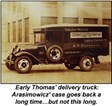Legal Brief: Doubting Thomas, English muffin distributor sues over route ownership

Contents
Tacit ownership agreement
Reading the fine print
Can I get that in writing?
1999 Bestfoods re-org prompts suit
Walter Arasimowicz was an independent distributor of Thomas' English Muffins in Eastern Pennsylvania for more than 30 years. He lost his routes when S.B. Thomas' ("Thomas") corporate parent, Bestfoods, Inc. and Bestfoods Baking Company, changed its business practices to require its distributors to purchase their routes from Bestfoods. Arasimowicz refused to buy his route from Bestfoods, on the ground that he had already bought the route from his predecessor distributor more than 30 years earlier. Apparently, Arasimowicz had paid Peter Coleman and Mike Todara $ 13,500 to acquire their right to distribute Thomas and Pepperidge Farm products.

Tacit ownership agreement
Reading the fine print
"It is understood that we do not assign territory on a permanent basis, and our decision to continue to ship products for your distribution is contingent upon our satisfaction with this arrangement in the future. It must be completely understood that you do not have a franchise to deliver our products."
Despite receiving this letter, Arasimowicz went through with his purchase from Coleman and Todara and started distributing Thomas' products.
Shortly thereafter, Arasimowicz also became an independent distributor of Pepperidge Farm baked goods. Pepperidge Farm provided Arasimowicz with a written contract which stipulated that he could be terminated only for cause.
Prior to Arasimowicz's purchase of whatever rights Todara and Coleman had, he was required to obtain approval from Thomas to become a distributor. To obtain the necessary permission, Arasimowicz spoke to Steven Kalinger, a representative of Thomas (as Bestfoods was then known). According to Arasimowicz, Kalinger assured him that he could be terminated as a distributor only for a few specific reasons such as not abiding by the stale policy; not paying his bill or indulging in some kind of illegal behavior that could put the company in a bad light. Otherwise, Kalinger promised him that he would not be terminated for any other reason "in perpetuity", said Arasimowicz.
Subsequently, Arasimowicz received a Letter Agreement from Kalinger confirming that he was an acceptable distributor to Thomas. However, the letter contained a statement that varied from Kalinger's earlier oral assurances. The key language read as follows:
